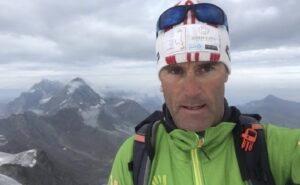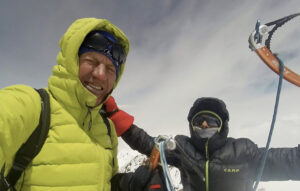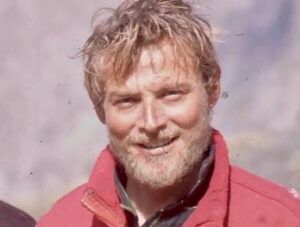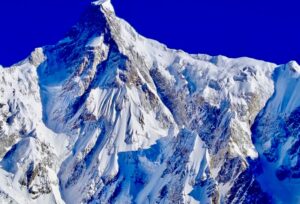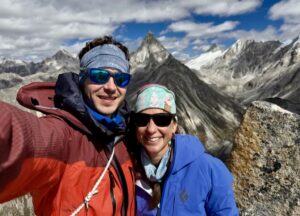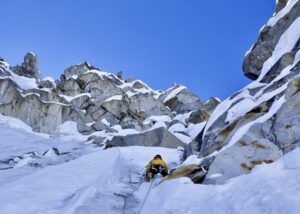The arrival of the monsoon usually marks the switch from Nepal to Pakistan for 8,000m climbers. In just three weeks, Pakistan expeditions supposedly begin, first with Nanga Parbat, then K2 and Broad Peak.
Yet the COVID situation on the Indian subcontinent, and in particular, the outbreaks in Everest and Dhaulagiri’s BC, cast a long shadow over the Karakorum and Pakistan’s Himalaya.
So far, Pakistan has dealt much better with COVID than Nepal. Banning movement between regions during the Eid holidays kept the contagion under control. Rates are now even decreasing.
In addition, COVID has not touched any expedition since Pakistan reopened to foreigners last fall. Small teams climbing new routes and skiing the slopes of Biafo-Hispar enjoyed a wildest-ever experience and returned home healthy. The large winter expedition to K2, which combined Nepali climbers and international clients, had no COVID-related issues in the two months that it lasted. Recently, Andrzej Bargiel led a successful ski expedition, and Luke Smithwick has guided and skied around the country. Neither reported problems.
This should encourage expeditions to continue with their summer plans. Moreover, as vaccinations progress in North America and Europe, many international visitors bound for the country’s five 8,000’ers may be fully vaccinated.

Andrzej Bargiel and his team had no COVID-related problems on Yarwash Sar, above, and Laila Peak. Photo: Pawlikowski Media
No Nepalis Allowed
Pakistan classifies countries into three health categories, A, B, and C. Citizens of A-list countries are welcome without even a PCR. Those from B-list ones should bring a recent PCR and will have a quick test at the airport, to ensure a negative result. Meanwhile, those from C-list countries are banned, except for special reasons. India and Nepal are on the C-list.
Yesterday, Pakistan issued a set of regulations to reopen the country to foreigners as of May 24, under strict COVID-19 protocols. The regs ban entry to anyone from C-list countries.
Authorities even issued a special clarifying document, below, for expeditions. It states that “all mountaineers, trackers, or high-altitude porters from Nepal AND those individuals who have been in Nepal in [the] past three weeks ARE NOT ALLOWED” to enter the country. There are no exceptions.
This excludes not only recreational climbers but also the Nepali Sherpas that many international expeditions rely upon, as well as Nepal’s powerful outfitters. Even foreigners who are still in Nepal — including all those currently on Everest — will have to spend three weeks at home before entering Pakistan.
It also requires that all climbers must be fully vaccinated.

Pakistan’s guidelines for reopening tourism.
Some might still wait and see if things change: The K2 and Gasherbrum season sometimes lasts until mid-August. But even if restrictions ease, it could be too late to arrange large commercial expeditions.
Nirmal Purja’s case is interesting. He holds dual Nepali-British citizenship, and his company, Elite Exped, is based in the UK. He may just need to go to England for some weeks before his planned K2+Broad Peak double-header. But his Nepali partners won’t be joining him.
A chance for Pakistani climbers?
As a response to the ban on Nepalis, Mingma G, the leader of Imagine Nepal, today decided to cancel his summer expedition. He expressed sorrow to his staff and clients, then added, “This is also a good opportunity for our Pakistani climber brothers to show who they are and what they can do on mountains.”
And what of Nepal’s biggest outfitter, Seven Summit Treks? SST, Mingma G, and Nirmal Purja led the last big expedition to Pakistan, to K2 in winter. It ended successfully for 11 Nepali climbers, who bagged the first winter ascent. But five other climbers died, including three who vanished during a second summit push.
This tragedy has colored the upcoming season. At last word, Sajid Sadpara of Pakistan is still leading an expedition to K2, partly to remove garbage and old ropes from the Abruzzi Spur, and partly to try to find the remains of his father, Mohammad Ali Sadpara, one of the men lost on the mountain.

Sajid Sadpara, right, and his late father, Mohammad Ali Sadpara.
Given the present uncertainty — we saw how quickly the situation in Nepal deteriorated — some international operators are not taking the risk. This includes Austria’s Furtenbach Adventures. It abruptly canceled its Everest expedition on the very day the summit push was to begin. The outfitter “will not make the same mistake” [with Pakistan], Stefan Nestler reports. Kobler & Partner of Switzerland has also given up its planned expedition to the Gasherbrum massif. More teams may follow in the next few days.
Emergency planning is harder in Pakistan than in Nepal, mainly because helicopter airlifts between K2 Base Camp and Skardu, managed by the military’s Askari Aviation, costs from $20,000 to $25,000, compared to Nepal’s $2,800. COVID cases shot up in Everest and Dhaulagiri Base Camps, partly due to a lot of careless behavior. This led to a lot of evacuations. But while helicopters in Nepal shuttle constantly between Kathmandu and the mountains, massive evacuations from the Karakorum would be highly difficult and unaffordable.

